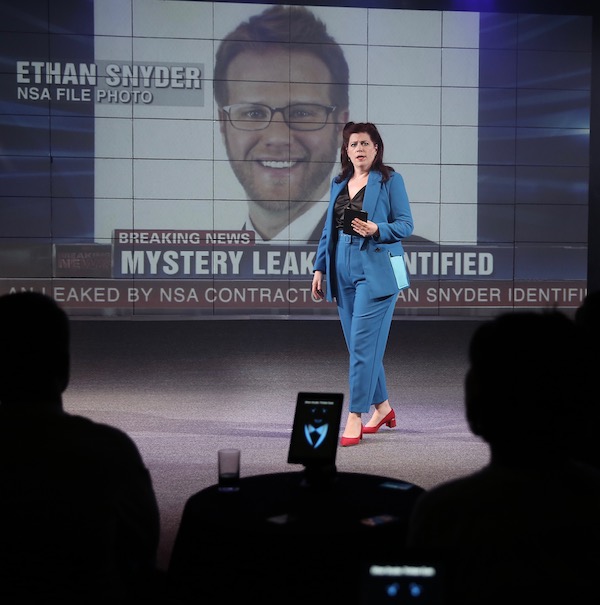Here’s spying on you, kid: High-tech opera premiere casts a wide net

Photo: Paula Court
Looking at You is a contemporary opera about a very contemporary concern.
The new work, with music by Kamala Sankaram and a libretto by Rob Handel, certainly isn’t the first opera to explore the problems of life online. Yet few others have so fully embraced what feels like a digital-age idiom.
The world premiere, presented by Opera on Tap and Experiments in Opera at HERE in SoHo on Friday night, showed remarkable creativity on the parts of its authors and producers, even if this work still needs a good deal of polishing.
Looking at You is set primarily inside the corporate headquarters of Rix, a grotesquely hip tech startup with all the latest employee amenities. Dorothy, the company’s newest hire, makes a brilliant pitch for a new app called “Check U Out,” designed to evaluate people in real time by using facial recognition to look up their social media profiles and public records.
Yet at the same time, her long-missing boyfriend Ethan Snyder—a thinly disguised Edward Snowden analogue who has just leaked 1.7 million classified documents on government surveillance programs—resurfaces and causes her to have second thoughts about her work and its privacy implications.
If that sounds a little confused, it is. While Handel’s libretto mostly manages to keep the narrative on track and features a number of beautifully crafted scenes (including one of Dorothy reading both sides of a long text conversation in reverse), it never quite settles on a main point. This work variously critiques Big Data, government surveillance, social media, startup culture, workplace harassment, artificial intelligence, racial inequities, and more. While many of these issues are related to one another in some way, by taking aim at all these targets at once, Handel fails to score a hit on any of them.
Still, the overall presentation was startlingly creative, incorporating a number of inventive elements into a unique visual presentation. At any given time, Kristin Marting’s digitally innovative staging features many stimuli competing for attention: screens showing four or five different newscasts about Snyder’s document dump; social media posts flying by; the tablets on our tables singing at us while the action on stage progresses. All of this is carefully stitched together, giving the audience a feeling of information overload without actually distracting from the scene.
The most unusual conceit, and one that really brings home the ideas of the piece, is the incorporation of audience members’ public social media posts (researched from the ticket list) into the presentation. In the climactic product launch scene, pictures from audience members’ feeds flash across the various screens and tabletop tablets in a demonstration of the app’s power to evaluate people in real time. What could easily have come off as a cheap gimmick was surprisingly effective, eliciting nervous laughter from audience members as their personal photos showed up in front of a room full of strangers.
Sankaram’s music combines forceful rhythms with a tart tonal style that varies according to the dramatic needs of the moment.
The chorus that opens the piece, introducing Rix’s unbearably hip workplace environment, has an almost candied quality, while there is something more sinister in the mellow saxes and creeping vocal melody of Dorothy’s initial product pitch.
Especially impressive is Sankaram’s ability to keep an initially unfocused idea moving forward for an extended time; in the scene in which Dorothy begins to have her doubts, as her machine-learning algorithm begins to spin out of control, Sankaram spins an unsettling chorus from bizarre snippets of status updates (“Dorothy liked bacon,” “something about zebras”), strung together into a flow of sound. Sankaram’s scoring is necessarily simple but effective, blending electronics with a small band of a few saxophones and a piano. Samuel McCoy led the performance with confidence, keeping a tight rein on the music in spite of a few technical glitches.
Blythe Gaissert, who shone brilliantly in On Site Opera’s production of Ricky Ian Gordon’s Morning Star last year, was formidable as Dorothy, with her powerful, caramel-colored mezzo-soprano. Her role as written feels a little flat, but Gaissert still managed a convincing performance, resolving the conflicting tensions of her past career struggles with her crisis of conscience now that she has achieved her goals. As Ethan, Brandon Snook showed a flexible, airy tenor in a difficult, wide-ranging part.
Adrienne Danrich brought a penetrating soprano as Annina, one of Rix’s other engineers. Soprano Mikki Sodergren showed a focused, blazing sound, and found different characterizations for Dorothy’s coworker Brooke and the journalist who blows open the Snyder story. As Rix employee Charlie, Eric McKeever offered a muscular baritone and showed off superb patter chops. The biggest personality among the supporting cast was the CEO, Raj, portrayed by Paul An as an “alpha male” tech type, with a robust, viscous bass.
Looking at You runs through September 21 at HERE Arts. experimentsinopera.com